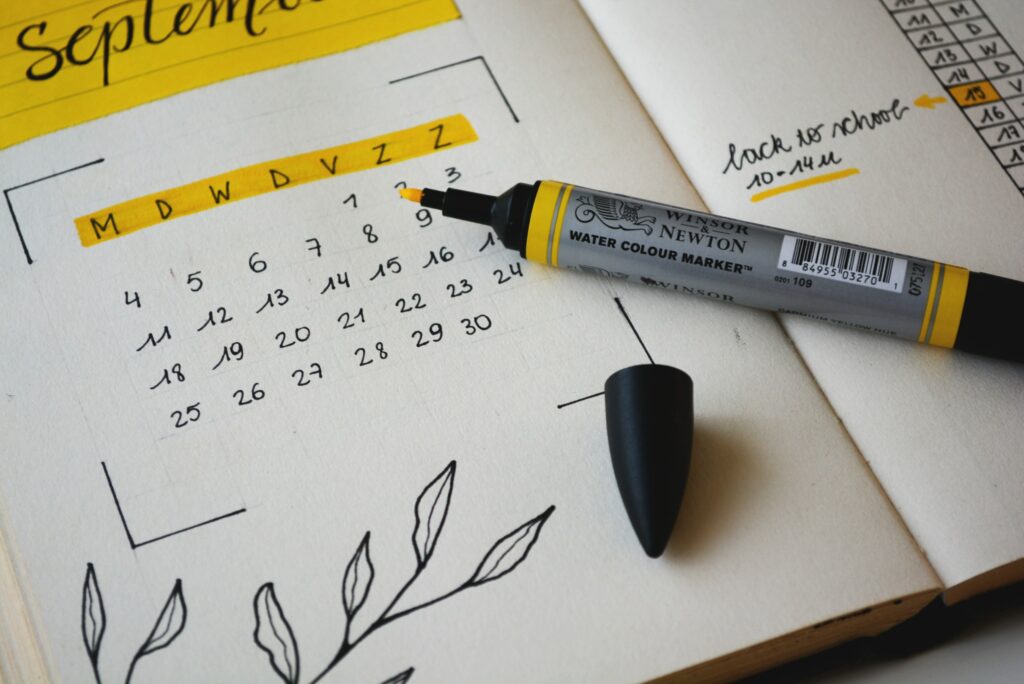Foto de Estée Janssens na Unsplash
Não é difícil encontrar pessoas que afirmam que conseguiram aprender um idioma até a fluência em 6 meses, 3 meses, 7 dias ou até 24 horas! É claro que afirmar que alcançar a fluência em um dia ou uma semana é bastante irreal. Mas será que dá para alcançar a fluência em um idioma em apenas 3 meses? Ou será que é apenas mais um mito da Internet e possivelmente um golpe para tomar dinheiro dos desavisados?
| Audio | |
|---|---|
Normal | Slow |
| English Transcript | Tradução |
| It seems like everybody nowadays wants to "reach fluency in three months" or "learn a language in 90 days". | Parece que hoje em dia todo mundo quer "chegar à fluência em três meses" ou "aprender um idioma em 90 dias". |
| But is that even possible? | Mas isso é mesmo possível? |
| Or is it just another Internet myth? | Ou é apenas mais um mito da Internet? |
| The answer might surprise you! | A resposta pode surpreender você! |
| Hey, I am Luca Lampariello, I am a language coach who speaks 14 languages and on this channel I help people learn foreign languages more efficiently, faster and in a fun way. | Ei, eu sou Luca Lampariello, sou um treinador de idiomas que fala 14 idiomas e neste canal eu ajudo as pessoas a aprender línguas estrangeiras de forma mais eficiente, rápida e divertida. |
| So, can you learn a language in 3 months? | Então, você pode aprender um idioma em 3 meses? |
| Let's find out! | Vamos descobrir! |
| Search Google or YouTube for nearly anything related to language learning nowadays, and you'll find all sorts of videos, blog posts and content about "learning a language fast". | Pesquise no Google ou no YouTube quase tudo relacionado ao aprendizado de idiomas hoje em dia e você encontrará todos os tipos de vídeos, postagens de blog e conteúdo sobre "aprender um idioma rapidamente". |
| It's not uncommon to see people claiming that it's possible to reach fluency in a few months, a few days, or even 24 hours! | Não é incomum ver pessoas afirmando que é possível atingir a fluência em alguns meses, alguns dias ou até 24 horas! |
| It's gotten so bad that one of the most common "fast" goals'reaching fluency in 3 months'sounds downright slow compared to a lot of the more outrageous examples. | Ficou tão ruim que um dos objetivos "rápidos" mais comuns - alcançar a fluência em 3 meses - parece totalmente lento em comparação com muitos dos exemplos mais ultrajantes. |
| But in a world where everyone wants fluency fast, is it even possible to learn a language at that speed? | Mas em um mundo onde todo mundo quer fluência rápido, é possível aprender um idioma nessa velocidade? |
| Can you really become fluent in 90 days? | Você pode realmente se tornar fluente em 90 dias? |
| If you ask me, there's some truth to it. | Se você me perguntar, há alguma verdade nisso. |
| But that truth comes with a lot of qualifiers, and a lot of caveats. | Mas essa verdade vem com muitos qualificadores e muitas ressalvas. |
| First of all, it's impossible to determine if someone has "reached fluency" until you define what "fluency" actually is. | Em primeiro lugar, é impossível determinar se alguém "atingiu a fluência" até que você defina o que realmente é "fluência". |
| Believe it or not, "fluency" is an incredibly vague word, with no universally agreed-upon definition. | Acredite ou não, "fluência" é uma palavra incrivelmente vaga, sem uma definição universalmente aceita. |
| Even within the online language learning community, everyone seems to define "fluent" in different ways. | Mesmo dentro da comunidade de aprendizado de idiomas on-line, todos parecem definir "fluente" de maneiras diferentes. |
| Because of this, when someone tells me that "I want to be fluent in Russian in 3 months", I have no idea what they're actually aiming to accomplish. | Por causa disso, quando alguém me diz que "quero ser fluente em russo em 3 meses", não tenho ideia do que eles realmente pretendem realizar. |
| "Fluency" here could mean anything from "basic conversational skills" to "sounding like an educated native speaker", and everything in between. | "Fluência" aqui pode significar qualquer coisa, desde "habilidades básicas de conversação" até "soar como um falante nativo educado" e tudo mais. |
| That's a massive range in skill levels, and only a few of those are remotely feasible in a 90-day period. | É uma gama enorme de níveis de habilidade, e apenas alguns deles são remotamente viáveis em um período de 90 dias. |
| So in order to determine if it's possible to reach fluency in three months, we need to settle on a definition of "fluency", and go from there. | Portanto, para determinar se é possível atingir a fluência em três meses, precisamos estabelecer uma definição de "fluência" e partir daí. |
| To me, being fluent means being comfortable in expressing yourself in most situations, as well as comfortably understanding what is being said to you. | Para mim, ser fluente significa estar confortável em se expressar na maioria das situações, bem como entender confortavelmente o que está sendo dito para você. |
| In short, I believe fluency is about familiarity and comfort with a language. | Resumindo, acredito que fluência é familiaridade e conforto com um idioma. |
| That's a good start, but to make things even clearer, let's also define what fluency is NOT. | É um bom começo, mas para deixar as coisas ainda mais claras, vamos também definir o que NÃO é fluência. |
| To me, fluency does not mean speaking perfectly like a native. | Para mim, fluência não significa falar perfeitamente como um nativo. |
| Nor does it mean understanding everything you read or hear. | Nem significa entender tudo o que você lê ou ouve. |
| That right there is a significant departure from the concept of fluency held by a lot of people, particularly non-language learners. | Isso aí é um afastamento significativo do conceito de fluência mantido por muitas pessoas, principalmente os que não aprendem idiomas. |
| It's not uncommon to hear people use "perfectly" and "fluently" interchangeably when talking about someone else's language skills. | Não é incomum ouvir as pessoas usarem "perfeitamente" e "fluentemente" de forma intercambiável ao falar sobre as habilidades linguísticas de outra pessoa. |
| But again, that's why we're defining our terms. | Mas, novamente, é por isso que estamos definindo nossos termos. |
| To make my definition of fluency even more concrete, I'd like to use an objective set of standards, one that is used by language learners and professionals all over the world: the Common European Framework of Reference for Languages, or CEFR for short. | Para tornar minha definição de fluência ainda mais concreta, gostaria de usar um conjunto objetivo de padrões, que é usado por alunos e profissionais de idiomas em todo o mundo: o Quadro Europeu Comum de Referência para Idiomas, ou CEFR, para abreviar. |
| Put simply, the CEFR is a set of guidelines for describing achievement and ability in language learners. | Simplificando, o CEFR é um conjunto de diretrizes para descrever o desempenho e a capacidade dos alunos de idiomas. |
| As part of these guidelines, there are six "reference levels" that describe the full range of skill levels in a foreign language. | Como parte dessas diretrizes, existem seis "níveis de referência" que descrevem toda a gama de níveis de habilidade em uma língua estrangeira. |
| From lowest to highest, these levels are A1, A2, B1, B2, C1, and C2. | Do mais baixo ao mais alto, esses níveis são A1, A2, B1, B2, C1 e C2. |
| The full details of this framework are beyond the scope of this video, but if you'd like to learn more about it, please check the description box for more information. | Os detalhes completos dessa estrutura estão além do escopo deste vídeo, mas se você quiser saber mais sobre ela, verifique a caixa de descrição para obter mais informações. |
| For now, though, I just want to touch upon the B2 level, which is the CEFR level that I believe most accurately corresponds to my definition of fluency. | Por enquanto, porém, quero apenas abordar o nível B2, que é o nível CEFR que acredito corresponder com mais precisão à minha definição de fluência. |
| According to the Council of Europe, a language learner able to speak at a B2 level: Can interact with a degree of fluency and spontaneity that makes regular interaction with native speakers quite possible, and Can take an active part in discussion in familiar contexts, accounting for and sustaining [their] views. | De acordo com o Conselho da Europa, um aluno de idiomas capaz de falar em nível B2: Pode interagir com um grau de fluência e espontaneidade que torna possível a interação regular com falantes nativos e Pode participar ativamente de discussões em contextos familiares, relatando para e sustentando [seus] pontos de vista. |
| That, in a nutshell, is what fluency means to me. | Isso, em poucas palavras, é o que fluência significa para mim. |
| A comfortable level of language skill that corresponds to a B2 on the CEFR scale. | Um nível confortável de habilidade de linguagem que corresponde a um B2 na escala CEFR. |
| So, with that in mind, let's take another shot at answering our key question: Is it possible to reach fluency in three months? | Então, com isso em mente, vamos tentar novamente responder à nossa pergunta-chave: É possível atingir a fluência em três meses? |
| Well, I've got good news, and bad news. | Bem, tenho boas e más notícias. |
| I'll start with the bad news: no, it's not possible to reach fluency (again, a B2 level) in three months. | Vou começar com a má notícia: não, não é possível atingir a fluência (novamente, um nível B2) em três meses. |
| I've met a lot of language learners in my life, and I've never met anyone who has managed to become fluent in that time period. | Eu conheci muitos alunos de idiomas em minha vida e nunca conheci ninguém que tenha conseguido se tornar fluente nesse período de tempo. |
| But this is why defining fluency is so important. | Mas é por isso que definir fluência é tão importante. |
| I say it's not possible, but that's according to my own definition. | Eu digo que não é possível, mas isso está de acordo com a minha própria definição. |
| If I were using other definitions of fluency, then my answer might be different. | Se eu estivesse usando outras definições de fluência, minha resposta poderia ser diferente. |
| Anyway, enough with the bad news. | Enfim, chega de más notícias. |
| What about the good news? | E as boas notícias? |
| Well the good news is that even though I believe it's impossible to become fluent in three months - no matter the language - it is certainly possible to make a lot of progress TOWARDS fluency in that time period! | Bem, a boa notícia é que, embora eu acredite que seja impossível se tornar fluente em três meses - não importa o idioma - certamente é possível progredir MUITO RUMO à fluência nesse período de tempo! |
| Believe me, I've met many, many people who managed to learn a heck of a lot of language in a three-month time span. | Acredite em mim, conheci muitas, muitas pessoas que conseguiram aprender um monte de idiomas em um período de três meses. |
| More than you can imagine, in fact! | Mais do que você pode imaginar, na verdade! |
| And at the end of those three months, those same people were well-poised to make a solid push towards fluency in the coming months, or years. | E no final desses três meses, essas mesmas pessoas estavam bem posicionadas para fazer caminhar fortemente rumo à fluência nos próximos meses ou anos. |
| So while I don't believe fluency is a worthwhile target in three months, I certainly believe it's worthwhile to learn as much as you can in that same time period. | Portanto, embora eu não acredite que a fluência seja uma meta viável em apenas três meses, certamente acredito que vale a pena aprender o máximo que puder no mesmo período de tempo. |
| But that leads us to a different question: if you can't reach fluency in three months, how much CAN you learn in that time? | Mas isso nos leva a uma pergunta diferente: se você não consegue atingir a fluência em três meses, o quanto PODE aprender nesse tempo? |
| Returning to our trusty CEFR scale, I believe the answer lies at the level just below B2, which, naturally, is called B1. | Voltando à nossa confiável escala CEFR, acredito que a resposta esteja no nível logo abaixo de B2, que, naturalmente, é chamado de B1. |
| According to the CEFR, the B1 is the first level where a learner can be considered an "independent user" of the language. | De acordo com o CEFR, o B1 é o primeiro nível em que um aprendiz pode ser considerado um "usuário independente" do idioma. |
| Personally, I like to refer to this level of skill as "conversational fluency", you're not fully fluent yet, but you're comfortable enough to speak and interact with others in a relatively smooth way, on a variety of common, everyday topics. | Pessoalmente, gosto de me referir a esse nível de habilidade como "fluência de conversação", você ainda não é totalmente fluente, mas se sente confortável o suficiente para falar e interagir com outras pessoas de uma forma relativamente tranquila, discutindo uma variedade de tópicos comuns do dia a dia. |
| Diving a little deeper into the CEFRs definition of the B1 level, we learn that someone at a B1 level: Can understand the main points of clear standard input on familiar matters regularly encountered in work, school, leisure, etc. | Mergulhando um pouco mais fundo na definição do nível B1 do CEFR, aprendemos que alguém no nível B1: Pode entender os principais pontos de entrada padrão sobre assuntos familiares encontrados regularmente no trabalho, escola, lazer, etc. |
| Can deal with most situations likely to arise while traveling in an area where the language is spoken. | Consegue lidar com a maioria das situações que podem surgir durante uma viagem em uma área onde o idioma é falado. |
| Can produce simple connected text on topics which are familiar or of personal interest. | É capaz de produzir texto simples e conectado sobre tópicos familiares ou de interesse pessoal. |
| Can describe experiences and events, dreams, hopes & ambitions and briefly give reasons and explanations for opinions and plans. | É capaz de descrever experiências e acontecimentos, sonhos, esperanças e ambições e dar brevemente razões e explicações para opiniões e planos. |
| In most cases, I believe such a level is entirely attainable by most dedicated language learners, so long as a few conditions are met. | Na maioria dos casos, acredito que esse nível seja totalmente alcançável pela maioria dos alunos de idiomas dedicados, desde que algumas condições sejam atendidas. |
| These conditions (in no particular order) are: | Essas condições (sem nenhuma ordem específica) são: |
| Time on task; | Tempo de dedicação; |
| The "distance" between your native and target languages; | A "distância" entre seu idioma nativo e o de destino; |
| And Life circumstances that are favorable for language learning. | E Circunstâncias de vida favoráveis ao aprendizado do idioma. |
| Let's talk about each of these a little more in depth: | Vamos falar um pouco mais sobre cada um deles: |
| First, "time on task": Three months is a little over 90 days. | Primeiro, "tempo de dedicação": Três meses é um pouco mais de 90 dias. |
| That might sound like a lot of time to get things done, but if you're an absolute beginner who wants to make a serious push towards a B1 level, then you're going to have to devote a huge chunk of that time to language learning, each and every day. | Isso pode parecer muito tempo para fazer as coisas, mas se você é um novato absoluto que quer fazer um esforço sério em direção ao nível B1, então você terá que dedicar uma grande parte desse tempo ao idioma aprendendo, a cada dia. |
| And I'm not talking one or two hours; to reach your three-month goal, you'll have to spend anywhere from three to eight hours a day learning. | E não estou falando de uma ou duas horas; para atingir sua meta de três meses, você terá que passar de três a oito horas por dia aprendendo, todos os dias. |
| That's practically a full-time job! | Isso é praticamente um trabalho de tempo integral! |
| If you don't have that amount of time to devote to your target language during those three months, it's simply not going to happen. | Se você não tiver tanto tempo para se dedicar ao seu idioma durante esses três meses, simplesmente não vai acontecer. |
| Next, let's talk about the distance between your native language and your target language. | A seguir, vamos falar sobre a distância entre sua língua nativa e sua língua-alvo. |
| Your ability to quickly reach a certain skill in your target language will greatly depend on how similar (or how different) that language is from your mother tongue. | Sua capacidade de alcançar rapidamente uma determinada habilidade em seu idioma de destino dependerá muito de quão semelhante (ou quão diferente) esse idioma é de sua língua materna. |
| It's important to note here that languages can differ in a wide variety of ways, often all at the same time. | É importante observar aqui que os idiomas podem diferir de várias maneiras, muitas vezes ao mesmo tempo. |
| These differences include grammar, pronunciation, intonation, word order, and more. | Essas diferenças incluem gramática, pronúncia, entonação, ordem das palavras e muito mais. |
| If the two languages are similar (like, say, English and Dutch), then great! | Se os dois idiomas forem semelhantes (como, digamos, inglês e holandês), ótimo! |
| Reaching B1 in three months is actually quite a reasonable goal for you. | Alcançar o B1 em três meses é, na verdade, uma meta bastante razoável para você. |
| But if the two languages are very different (like, for example, English and Japanese), even reaching a B1 is unlikely to happen in three months. | Mas se os dois idiomas são muito diferentes (como, por exemplo, inglês e japonês), nem chegar a um B1 é provável em três meses. |
| Let's make these examples a bit more concrete by taking one sentence, and translating it across each of these languages. | Vamos tornar esses exemplos um pouco mais concretos pegando uma frase e traduzindo-a em cada um desses idiomas. |
| First, English and Dutch, which are our two "close languages". | Primeiro, inglês e holandês, que são nossas duas "línguas próximas". |
| I heard that Amsterdam is a fantastic city. I want to live there. | I heard that Amsterdam is a fantastic city. I want to live there. |
| Ik hoorde dat Amsterdam een fantastische stad is. Ik wil daar leven. | Ik hoorde dat Amsterdam een fantastische stad is. Ik wil daar leven. |
| Looking at these sentences, it's possible to determine that English and Dutch share similar vocabulary ("I heard" vs "Ik hoorde", "I want to live there" vs "Ik wil daar leven"). | Olhando para essas frases, é possível determinar que o inglês e o holandês compartilham um vocabulário semelhante ("Iheard" vs "Ik hoorde", "I want to live there" vs "Ik wil daar leven"). |
| You might also be able to tell that they share a similar word order, too: I heard that: ik hoorde dat, I want to live there vs Ik wil daar leven) And these are just the beginning of all the many similarities these two languages share. | Você também pode perceber que elas compartilham uma ordem de palavras semelhante: Ouvi dizer que: ik hoorde dat, quero morar lá vs Ik wil daar leven) E essas são apenas o começo de todas as muitas semelhanças que esses dois idiomas compartilham. |
| For example, they even compose words in similar ways, and share a similar pronunciation, too! | Por exemplo, eles até compõem palavras de maneiras semelhantes e também compartilham uma pronúncia semelhante! |
| Let's now move on to our more "distant" pair of languages, English and Japanese: | Passemos agora ao nosso par de línguas mais "distante", inglês e japonês: |
| I heard that Amsterdam is a fantastic city.I want to live there. | I heard that Amsterdam is a fantastic city.I want to live there. |
| Amusuterudamu wa/ subarashii machi da so-u desu. zehi sunde mitaii desu ne. | Amusuterudamu wa/ subarashii machi da so-u desu. zehi sunde mitaii desu ne. |
| Looking at the word order, the differences stand out right away. | Olhando para a ordem das palavras, as diferenças se destacam imediatamente. |
| Translated word-by-word, the Japanese sentence literally means "Amsterdam fantastic city to be I heard. I there live want to". | Traduzida palavra por palavra, a frase japonesa significa literalmente "Amsterdã, cidade fantástica que ouvi. Eu moro lá, quero". |
| Pretty different, huh? | Bem diferente, né? |
| And that's just the beginning. | E isso é apenas o começo. |
| Japanese and English have vastly different sound systems, grammar patterns, and intonation rules - not to mention the completely different writing systems! | Japonês e inglês têm sistemas de som, padrões gramaticais e regras de entonação muito diferentes - sem mencionar os sistemas de escrita completamente diferentes! |
| If you're an English speaker who wants to learn Japanese, reaching even a B1 level is going to take you much, much longer than 90 days. | Se você é um falante de inglês que quer aprender japonês, atingir o nível B1 levará muito, muito mais do que 90 dias. |
| It can be done, for sure, but the time investment is typically on the scale of a year or more, rather than a few months. | Isso pode ser feito, com certeza, mas o investimento de tempo geralmente é da ordem de um ano ou mais, em vez de alguns meses. |
| Let's move on to our last influential factor for reaching a B1 in three months: your life circumstances, and how favorable they are for language learning. | Vamos passar para nosso último fator que influencia alcançar o nível B1 em três meses: suas circunstâncias de vida e quão favoráveis elas são para o aprendizado de idiomas. |
| As with any skill, language learning is something you get better at with time and experience. | Como acontece com qualquer habilidade, o aprendizado de idiomas é algo que você melhora com o tempo e a experiência. |
| If you've never learned a language before, it might take you months or years to reach a B1 level in your first new language, but with every subsequent language after that, things get easier and easier. | Se você nunca aprendeu um idioma antes, pode levar meses ou anos para atingir um nível B1 em seu primeiro novo idioma, mas com cada idioma subseqüente depois disso, as coisas ficam cada vez mais fáceis. |
| For that reason, an experienced language learner will be much more likely to reach conversational fluency in three months than a complete newbie would. | Por esse motivo, um aprendiz de idiomas experiente terá muito mais chances de alcançar a fluência de conversação em três meses do que um novato completo. |
| If you know what works, you can start applying it right away, and that leads to less wasted time overall. | Se você sabe o que funciona, pode começar a aplicá-lo imediatamente, e isso leva a menos perda de tempo em geral. |
| Other aspects of your life can make it easier or harder to learn languages too. | Outros aspectos da sua vida também podem facilitar ou dificultar o aprendizado de idiomas. |
| In an earlier example, I mentioned that you need to do a lot of daily learning to even hope to be able to reach B1 in three months. | Em um exemplo anterior, mencionei que você precisa aprender muito diariamente para até mesmo esperar atingir o B1 em três meses. |
| A person with a busy work or family life probably won't be able to attempt that. | Uma pessoa com uma vida profissional ou familiar ocupada provavelmente não será capaz de tentar isso. |
| And then there's the matter of having access to the language you're learning. | E ainda tem a questão de ter acesso ao idioma que você está aprendendo. |
| If you're in a place where it's difficult to find natives to practice with and good materials to learn from, then the task of reaching conversational fluency becomes way, way harder than it would otherwise be. | Se você está em um lugar onde é difícil encontrar nativos para praticar e bons materiais para aprender, então a tarefa de alcançar a fluência de conversação torna-se muito, muito mais difícil do que seria de outra forma. |
| On the other hand, if you're literally IN a country where that language is the dominant language, things suddenly become a lot more manageable, even in short time frames. | Por outro lado, se você está literalmente em um país onde esse idioma é o idioma dominante, as coisas de repente se tornam muito mais gerenciáveis, mesmo em curtos períodos de tempo. |
| Now that you understand some of the factors that influence how fast a language can be learned, you'll be better equipped to look at your life and your target language and determine what kind of language goals are most reasonable for you. | Agora que você entende alguns dos fatores que influenciam a rapidez com que um idioma pode ser aprendido, você estará mais bem equipado para olhar para sua vida e seu idioma de destino e determinar que tipo de objetivos linguísticos são mais razoáveis para você. |
| That's all I have for you today, but before we go, let's do a quick recap of what we talked about: To start, we raised a popular question: is it possible to become fluent in three months? | Isso é tudo que tenho para você hoje, mas antes de irmos, vamos fazer uma rápida recapitulação do que falamos: Para começar, levantamos uma pergunta popular: é possível se tornar fluente em três meses? |
| Then, we talked about how the answer depends on your definition of fluency. | Então, falamos sobre como a resposta depende da sua definição de fluência. |
| If your definition of fluency is like mine - close to a B2 level on the CEFR scale, then the answer is no. | Se a sua definição de fluência é como a minha - perto de um nível B2 na escala CEFR, a resposta é não. |
| That being said, you certainly can still aim to achieve a lot in a three-month period. | Dito isto, você certamente ainda pode almejar muito em um período de três meses. |
| In fact, I think reaching a B1 level (the level just below B2) is certainly possible, so long as certain factors are in place that will help you learn as quickly and efficiently as possible. | Na verdade, acho que atingir o nível B1 (o nível logo abaixo do B2) é certamente possível, desde que certos fatores estejam presentes para ajudá-lo a aprender da maneira mais rápida e eficiente possível. |
| The first of these factors is your time on task. | O primeiro desses fatores é o seu tempo de dedicação. |
| If you can spend three to eight hours each day on language learning, then you'll have a good shot of reaching your goal. | Se você puder passar de três a oito horas por dia aprendendo idiomas, terá uma boa chance de atingir seu objetivo. |
| The second of these three factors is how close your target language is to your native language. | O segundo desses três fatores é o quão próximo seu idioma de destino está do seu idioma nativo. |
| If they're very close in structure, vocabulary, and pronunciation, then learning quickly will be much easier. | Se eles estiverem muito próximos em estrutura, vocabulário e pronúncia, aprender rapidamente será muito mais fácil. |
| The last of these factors is your set of life circumstances. | O último desses fatores é o seu conjunto de circunstâncias de vida. |
| If you've got lots of previous language experience, lots of time, and lots of access to learning opportunities, then you'll have the opportunity to learn quite quickly. | Se você tem muita experiência anterior no idioma, muito tempo e muito acesso a oportunidades de aprendizado, terá a oportunidade de aprender rapidamente. |
| Okay, that's all for this video. | Ok, isso é tudo para este vídeo. |
| If you'd like to learn more about how I personally would go about learning as much language as possible within three months, then check out the link in the description box! | Se você quiser saber mais sobre como eu pessoalmente faria para aprender o máximo de idiomas possível em três meses, verifique o link na caixa de descrição! |
| Thanks for watching, and as always: happy language learning! | Obrigado por assistir e, como sempre: feliz aprendizado de idiomas! |
Contagem de palavras
A tabela abaixo exibe as palavras encontradas neste vídeo, bem como o número de vezes em que aparecem.
Veja também: Para que serve esta tabela?
| Freq. | Palavra | Freq. | Palavra | Freq. | Palavra |
|---|---|---|---|---|---|
| 96 | to | 85 | a | 66 | is |
| 63 | the | 63 | in | 61 | of |
| 53 | and | 50 | that | 46 | language |
| 43 | you | 37 | I | 31 | fluency |
| 30 | it | 26 | are | 23 | three |
| 23 | months | 21 | b | 20 | your |
| 20 | if | 20 | for | 19 | can |
| 18 | time | 17 | on | 17 | level |
| 15 | with | 15 | or | 15 | learning |
| 15 | learn | 15 | but | 14 | possible |
| 14 | not | 14 | more | 14 | have |
| 14 | as | 13 | these | 13 | be |
| 12 | languages | 12 | even | 11 | will |
| 11 | then | 11 | reach | 11 | lot |
| 11 | like | 11 | at | 11 | about |
| 10 | us | 10 | there | 10 | an |
| 9 | what | 9 | so | 9 | let |
| 9 | believe | 8 | how | 8 | fluent |
| 8 | different | 8 | definition | 7 | we |
| 7 | want | 7 | this | 7 | target |
| 7 | reaching | 7 | much | 7 | most |
| 7 | make | 7 | life | 7 | from |
| 7 | english | 7 | cefr | 7 | all |
| 6 | would | 6 | word | 6 | skill |
| 6 | similar | 6 | people | 6 | our |
| 6 | no | 6 | news | 6 | native |
| 6 | me | 6 | just | 6 | ik |
| 6 | good | 6 | first | 5 | who |
| 5 | where | 5 | two | 5 | they |
| 5 | than | 5 | period | 5 | order |
| 5 | my | 5 | might | 5 | live |
| 5 | learners | 5 | japanese | 5 | heard |
| 5 | few | 5 | factors | 5 | days |
| 5 | by | 5 | become | 5 | answer |
| 4 | which | 4 | well | 4 | way |
| 4 | wants | 4 | those | 4 | things |
| 4 | task | 4 | take | 4 | start |
| 4 | someone | 4 | share | 4 | scale |
| 4 | quickly | 4 | one | 4 | met |
| 4 | levels | 4 | hours | 4 | fast |
| 4 | easier | 4 | each | 4 | do |
| 4 | determine | 4 | day | 4 | conversational |
| 4 | close | 4 | certainly | 4 | being |
| 4 | bad | 4 | amsterdam | 4 | able |
| 3 | wil | 3 | ways | 3 | vs |
| 3 | towards | 3 | too | 3 | short |
| 3 | set | 3 | same | 3 | right |
| 3 | quite | 3 | question | 3 | pronunciation |
| 3 | out | 3 | other | 3 | now |
| 3 | month | 3 | means | 3 | mean |
| 3 | many | 3 | lots | 3 | little |
| 3 | leven | 3 | learner | 3 | hoorde |
| 3 | going | 3 | goal | 3 | go |
| 3 | get | 3 | full | 3 | find |
| 3 | fantastic | 3 | familiar | 3 | example |
| 3 | dutch | 3 | define | 3 | daar |
| 3 | common | 3 | comfortable | 3 | city |
| 3 | circumstances | 3 | between | 3 | am |
| 3 | actually | 3 | according | 2 | years |
| 2 | worthwhile | 2 | world | 2 | work |
| 2 | within | 2 | why | 2 | while |
| 2 | when | 2 | were | 2 | vocabulary |
| 2 | video | 2 | very | 2 | variety |
| 2 | use | 2 | upon | 2 | understanding |
| 2 | understand | 2 | uncommon | 2 | truth |
| 2 | topics | 2 | though | 2 | talking |
| 2 | talked | 2 | talk | 2 | systems |
| 2 | spend | 2 | speaker | 2 | speak |
| 2 | sound | 2 | some | 2 | skills |
| 2 | situations | 2 | simply | 2 | shot |
| 2 | sentence | 2 | seems | 2 | say |
| 2 | said | 2 | reference | 2 | reasonable |
| 2 | range | 2 | push | 2 | place |
| 2 | personally | 2 | perfectly | 2 | part |
| 2 | over | 2 | nowadays | 2 | never |
| 2 | need | 2 | move | 2 | matter |
| 2 | managed | 2 | looking | 2 | long |
| 2 | literally | 2 | likely | 2 | learned |
| 2 | leads | 2 | last | 2 | intonation |
| 2 | interact | 2 | impossible | 2 | important |
| 2 | here | 2 | help | 2 | hear |
| 2 | has | 2 | harder | 2 | happen |
| 2 | guidelines | 2 | grammar | 2 | got |
| 2 | framework | 2 | foreign | 2 | favorable |
| 2 | fact | 2 | experience | 2 | examples |
| 2 | everything | 2 | everyone | 2 | every |
| 2 | enough | 2 | eight | 2 | efficiently |
| 2 | done | 2 | does | 2 | distance |
| 2 | differences | 2 | devote | 2 | desu |
| 2 | description | 2 | describe | 2 | defining |
| 2 | dat | 2 | corresponds | 2 | conditions |
| 2 | concrete | 2 | check | 2 | certain |
| 2 | c | 2 | box | 2 | better |
| 2 | below | 2 | beginning | 2 | before |
| 2 | away | 2 | anything | 2 | another |
| 2 | also | 2 | again | 2 | access |
| 2 | ability | 1 | zehi | 1 | youtube |
| 1 | yourself | 1 | yet | 1 | year |
| 1 | writing | 1 | works | 1 | words |
| 1 | wide | 1 | watching | 1 | wasted |
| 1 | wa | 1 | views | 1 | videos |
| 1 | vastly | 1 | vague | 1 | using |
| 1 | user | 1 | used | 1 | until |
| 1 | unlikely | 1 | universally | 1 | u |
| 1 | typically | 1 | trusty | 1 | traveling |
| 1 | translating | 1 | translated | 1 | touch |
| 1 | tongue | 1 | today | 1 | think |
| 1 | their | 1 | thanks | 1 | text |
| 1 | terms | 1 | tells | 1 | tell |
| 1 | taking | 1 | sustaining | 1 | surprise |
| 1 | sure | 1 | sunde | 1 | suddenly |
| 1 | such | 1 | subsequent | 1 | subarashii |
| 1 | structure | 1 | still | 1 | standards |
| 1 | standard | 1 | stand | 1 | stad |
| 1 | spontaneity | 1 | spoken | 1 | speed |
| 1 | speaks | 1 | speaking | 1 | speakers |
| 1 | span | 1 | sounding | 1 | sorts |
| 1 | something | 1 | solid | 1 | smooth |
| 1 | slow | 1 | six | 1 | simple |
| 1 | similarities | 1 | significant | 1 | settle |
| 1 | serious | 1 | sentences | 1 | see |
| 1 | second | 1 | search | 1 | scope |
| 1 | school | 1 | russian | 1 | rules |
| 1 | returning | 1 | remotely | 1 | relatively |
| 1 | related | 1 | regularly | 1 | regular |
| 1 | refer | 1 | recap | 1 | reasons |
| 1 | reason | 1 | really | 1 | read |
| 1 | reached | 1 | rather | 1 | raised |
| 1 | quick | 1 | qualifiers | 1 | put |
| 1 | progress | 1 | professionals | 1 | produce |
| 1 | probably | 1 | previous | 1 | pretty |
| 1 | practice | 1 | practically | 1 | posts |
| 1 | popular | 1 | poised | 1 | points |
| 1 | please | 1 | plans | 1 | personal |
| 1 | person | 1 | patterns | 1 | particularly |
| 1 | particular | 1 | pair | 1 | own |
| 1 | overall | 1 | outrageous | 1 | otherwise |
| 1 | others | 1 | opportunity | 1 | opportunities |
| 1 | opinions | 1 | only | 1 | online |
| 1 | okay | 1 | often | 1 | objective |
| 1 | nutshell | 1 | note | 1 | nor |
| 1 | non | 1 | next | 1 | newbie |
| 1 | new | 1 | nearly | 1 | ne |
| 1 | naturally | 1 | natives | 1 | myth |
| 1 | mother | 1 | months'sounds | 1 | mitaii |
| 1 | mine | 1 | mind | 1 | mentioned |
| 1 | mention | 1 | matters | 1 | materials |
| 1 | massive | 1 | manageable | 1 | makes |
| 1 | main | 1 | machi | 1 | luca |
| 1 | lowest | 1 | look | 1 | longer |
| 1 | link | 1 | lies | 1 | less |
| 1 | leisure | 1 | lampariello | 1 | know |
| 1 | kind | 1 | key | 1 | job |
| 1 | investment | 1 | into | 1 | internet |
| 1 | interest | 1 | interchangeably | 1 | interaction |
| 1 | input | 1 | information | 1 | influential |
| 1 | influence | 1 | independent | 1 | incredibly |
| 1 | include | 1 | imagine | 1 | idea |
| 1 | huh | 1 | huge | 1 | hopes |
| 1 | hope | 1 | highest | 1 | hey |
| 1 | held | 1 | heck | 1 | having |
| 1 | happy | 1 | hand | 1 | greatly |
| 1 | great | 1 | gotten | 1 | |
| 1 | goals'reaching | 1 | goals | 1 | give |
| 1 | fun | 1 | fully | 1 | frames |
| 1 | fluently | 1 | feasible | 1 | faster |
| 1 | fantastische | 1 | family | 1 | familiarity |
| 1 | factor | 1 | expressing | 1 | explanations |
| 1 | experiences | 1 | experienced | 1 | everyday |
| 1 | everybody | 1 | events | 1 | european |
| 1 | europe | 1 | etc | 1 | equipped |
| 1 | entirely | 1 | end | 1 | encountered |
| 1 | else's | 1 | een | 1 | educated |
| 1 | earlier | 1 | during | 1 | dreams |
| 1 | downright | 1 | dominant | 1 | diving |
| 1 | distant | 1 | discussion | 1 | difficult |
| 1 | differ | 1 | details | 1 | describing |
| 1 | depth | 1 | depends | 1 | depend |
| 1 | departure | 1 | degree | 1 | definitions |
| 1 | deeper | 1 | dedicated | 1 | deal |
| 1 | daily | 1 | da | 1 | country |
| 1 | council | 1 | could | 1 | contexts |
| 1 | content | 1 | considered | 1 | connected |
| 1 | concept | 1 | compose | 1 | completely |
| 1 | complete | 1 | compared | 1 | community |
| 1 | coming | 1 | comfortably | 1 | comfort |
| 1 | comes | 1 | coach | 1 | clearer |
| 1 | clear | 1 | claiming | 1 | chunk |
| 1 | channel | 1 | cefrs | 1 | caveats |
| 1 | cases | 1 | cannot | 1 | called |
| 1 | busy | 1 | briefly | 1 | blog |
| 1 | bit | 1 | beyond | 1 | beginner |
| 1 | becomes | 1 | because | 1 | basic |
| 1 | attempt | 1 | attainable | 1 | aspects |
| 1 | ask | 1 | arise | 1 | area |
| 1 | applying | 1 | anywhere | 1 | anyway |
| 1 | anyone | 1 | any | 1 | answering |
| 1 | amusuterudamu | 1 | amount | 1 | ambitions |
| 1 | always | 1 | aiming | 1 | aim |
| 1 | agreed | 1 | after | 1 | active |
| 1 | across | 1 | achievement | 1 | achieve |
| 1 | accurately | 1 | accounting | 1 | accomplish |
| 1 | absolute | 1 | & |











Excelente